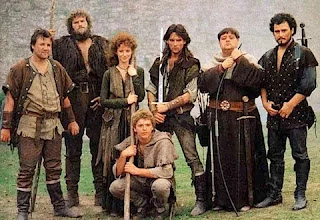For some reason, I can't bring myself to write a formal review of Robin of Sherwood. I watched too many episodes in too short a span too long ago to compose a comprehensive review. So, what follows will be a jumble of thoughts. I apologize to my handful of readers for the lack of thoroughness. Perhaps, if I ever have access to the entire series without commercial interruptions, I shall one day share my observations in greater detail.
Robin of Sherwood, a British television show first broadcast in the mid-1980s, is a tantalizing mixture of history, folklore, and fairytale. In this incarnation, Robin Hood is motivated equally by a personal moral vision shaped by circumstances and by a sacred bond to a pagan deity, Herne (John Albineri). There is, of course, highway robbery, political intrigue, daring rescues, and well-intentioned swashbuckling aplenty, but there is also an impressive variety of magic. The addition of the fantastical brings something new and, perhaps more importantly, something unpredictable to the legend of Robin Hood. One of the most impressive examples is the character of the Baron de Belleme (Anthony Valentine), about whom no more will be said lest ye watch it...
For the first two seasons, Robin (of Loxley) is played exceptionally well by Michael Praed. He is replaced in the third season rather less ably by Jason Connery, who plays the other version of Robin Hood, Robin of Huntingdon. It's a clever solution to Praed's departure, but the execution was less than satisfactory. The story seemed to lose momentum and the characters became tired caricatures. Before the end of the third season, I found myself wishing it had ended with the second.
My least favorite aspect of Robin of Sherwood, apart from the third season, is the music, which was scored by the Irish band Clannad. I have enjoyed some of their music and even some of their film scores, but their music for Robin of Sherwood is monotonous and more reminiscent of New Age—not the Middle Ages. At one point, there's a scene where the characters are actually supposed to be dancing to music being performed in their midst, but instead of music appropriate to the time period, the musicians are somehow producing sounds that could only be created by synthesizers. If it were a Blake Edwards production (or a Mel Brooks production), I would understand. In a drama, the choice is a failure. It would have been better to have cast real folk musicians in the scene playing period appropriate instruments.
Overall, I enjoyed the first two seasons immensely and found the third to be a disappointment. The score is regrettable, but at least I can mute the theme music.
Writing: Good (S1-2); Poor (S3)
Directing: Good (S1-2); Fair (S3)
Acting: Good (S1-2); Fair (S3)
Cinematography: Good
Stunts: Good
Swordplay: Fair
Panache: Great (S1-2); Mediocre (S3)
Overall Rating: Good (S1-2); Fair (S3)
Swashbuckling Rank: Good (S1-2); Fair (S3)
Written by: various
Directed by: various
Performed by: Michael Praed, Judi Trott, Phil Rose, Clive Mantle, Mark Ryan, Ray Winstone, Peter Llewellyn Williams, Jason Connery, et al.
[Read this article from The History Files for more information about Robin of Sherwood.]







